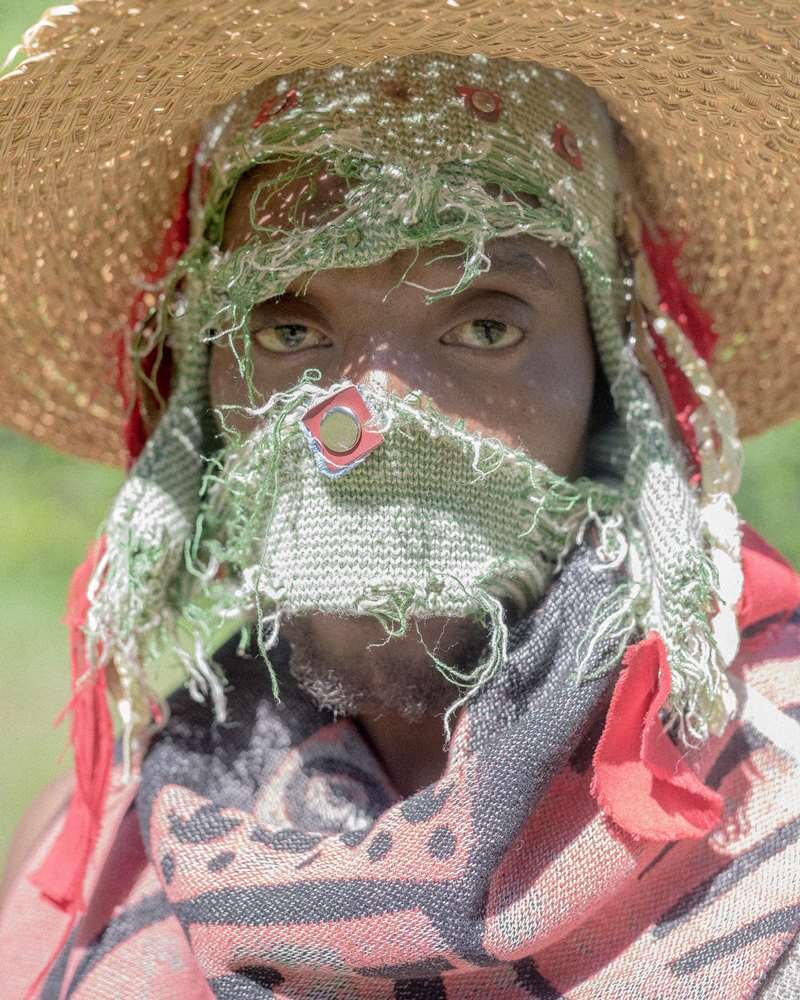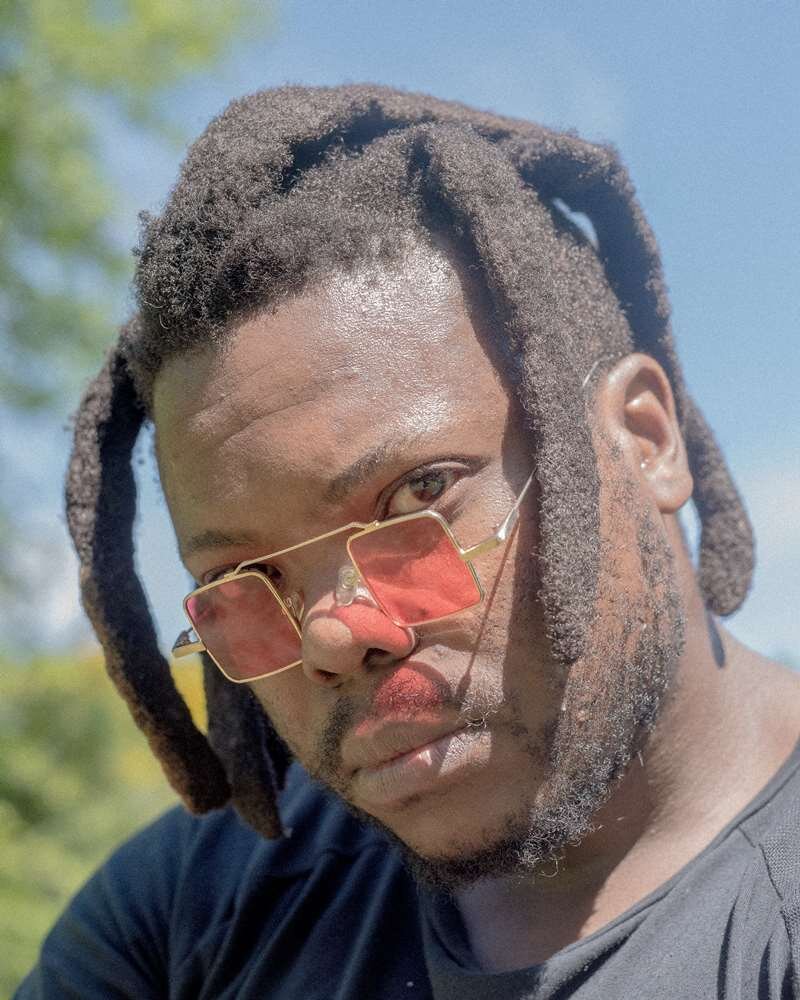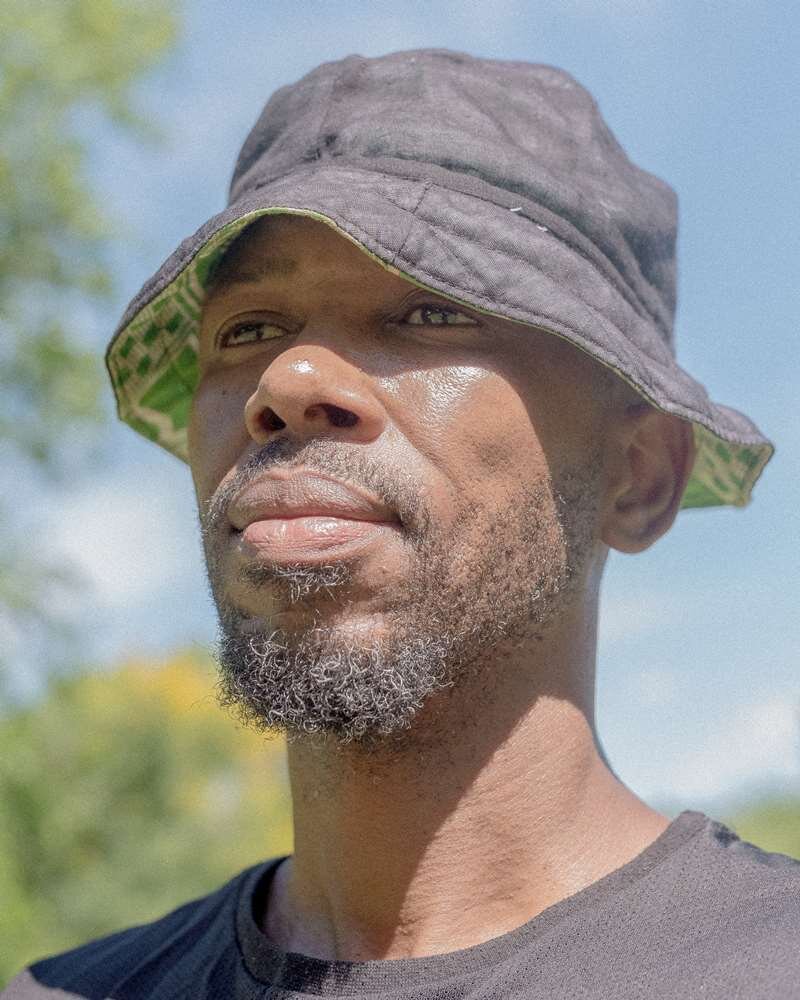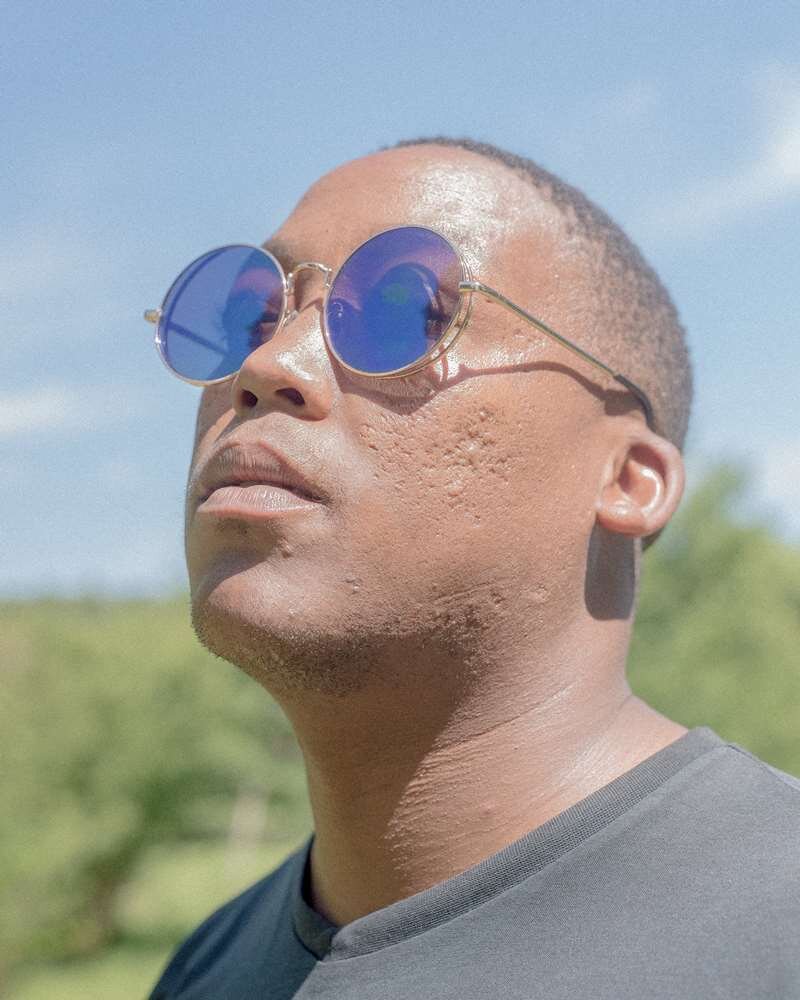Exclusive: Nataal debuts BLK JKS’ video for ‘Harare’ featuring Morena Leraba and talks to the band
IT’S OCTOBER 2019
On their 2009 Secretly Canadian debut album After Robots, Joburg demigods BLK JKS have an Andrew Donsumu-photographed portrait of a man covered in a balaclava. I'm en route from the gully city centre to the tranquil outlands of Magaliesberg, the chosen location for their video shoot, when a recurring thought crystallises on each iteration: Morena Leraba, the balaclava'd emcee who features on their current single ‘Harare’, is the real-time manifestation of that album cover.
‘Harare’ was inspired by a 2011 trip to Zimbabwe's HIFA festival. "We didn’t even need to sleep. We had a great time individually, as the BLK JKS. When I went out at night gallivanting, I just came back in the morning to freshen up, go see more of Harare, play the show and disappear again,” said drummer Tshepang Ramoba in an interview.
However, famo singer Leraba's verse on the new song doesn’t reflect this positive reflection. It revolves around the difficulties of working-class Basotho who have to navigate South Africa-Lesotho border bureaucracy every time they leave, or come back, home. Based mostly in the Lesotho capital Maseru for the time being, he is in a prime position to tell that story.
The sample lines ‘hoba ha ke na le pasa/ ke tsoa paqama mehla le mehla, setsamaea,’ speak to the precarity of having to stretch the 30-day on-arrival visas for the rest of the year - because people can't afford the monthly transport to head back and renew them; and then having to cross via illegal routes in order to avoid getting banned from their host country for a year or more. In so doing, he illustrates the parallels between migrant labourers across Southern Africa in general, and between the twin cities of Maseru and Harare in particular. (Aside: The South African government has issued special, four-year permits to Lesotho and Zimbabwe citizens to curb high incidences of illegal border crossings.)
Upon my arrival Nirox, a sanguine Magaliesberg retreat owned by Jonathan Liebmann's father that also doubles as an artist's retreat and sculpture park, Leraba arranges for the gate to be opened. Jonathan is tangential to the BLK JKS' story by virtue of him borrowing some of daddy's millions to purchase some run-down property located towards the Eastern edge of Joburg city centre, in an industrial area called Jeppestown. Alongside his business partners, he christened his pet gentrification project as Maboneng, and ran it on rickety wheels until its collapse in April 2018.
Maboneng had all the trappings of any early-stage gentrification enterprise - affordable rent, meaning that artists found it a viable accommodation option; a weekly church by way of the Sunday market at Arts on Main, which doubled as a meeting spot for Jozi cool; and some street side cafes on the bottom floor of its flagship block of apartments called Main Street Life, where the weekend's connections could be mapped out into solid strategies. The area became a vital meeting spot for artists from 2009 when it started.
A decade removed from that sweet lie packaged as 'bringing people back to the city', the business owners and residents left in the great propertuity demise struggle with post-gentrification fatigue. And today the BLK JKS are far from the quartet that covered The Africa Issue of The Fader in March 2008. Meanwhile, Jonathan dusted off that bad memory and raised a cool 20 million Rands towards developing a property-centric mobile app called Flow.
“It's when we get together as a band in a rehearsal room that the music goes where it wants to go”
A swift walk from the gate towards where the band members are located is laced with sculptures from Mary Sibande's The Purple Shall Govern series (2013). Guitarist Mpumi Mcata is still out and about handling filming gear-related matters. While Ramoba, bassist Molefi Makananise, and trumpeter Tebogo Seitei sit and wait. Also present is the renowned multi-disciplinary fine artist Nandipha Mntambo, who begins applying make-up, which consists of prosthetic touches, for the photoshoot towards her new body of work. The idea is to document that process for the ‘Harare’ video, and to use one of the resulting photographic works for the band's sophomore album, Abantu / Before Humans, scheduled for 2020.
"We've just wanted to collaborate for the longest time, really. We've finally found a moment where for her, she's branching off from where she was before, thematically," says Mpumi when he finds a moment to settle down. "Even when she was starting, we had met to talk about collaboration. That was around when we were starting to kick off as well. Then life went different ways."
The alternative rock band scene in Jozi has had its almost-moments in the decade that elapsed since After Robots. Bands like The Brother Moves On had their time; they even collaborated with the BLK JKS on a once-off live show called The BLK BRTHR in 2015. Bantu Continua Uhuru Consciousness, who started at roughly the same time as the BLK JKS, have become a successful touring band. The likes of Impande Core and 8 Bars Short that didn't survive the inner machinations of a band life. Mpumi says that the internal strife that following their return to Jozi – they’d spent a few months grinding in New York – contributed to their label Secretly Canadian's ultimate disinterest in them.
"I think we wanted to work from Jozi. But then at the same time, you don't have the support system to do that here, in many ways, on many levels. You're basically swimming upstream the whole time. But your love of the place, and your stubbornness, which in some ways makes you a good artist, is also the thing that holds you down. At the same time you get angry; why does living in Johannesburg and wanting to be an international working musician mean that I'm holding myself down," he ponders.
A new album from the BLK JKS means, locally at least, locating a corner in a scene that is currently occupied by the likes of Sun Xa Experiment, Urban Village and Iphupho l'ka Biko – bands directly and indirectly influenced by the work they put in since circa 2005 when they unwittingly picked up guitars, and successively graduated from a garage jam band to one of black Mzansi's wildest success stories. After Robots saw them hailed by Rolling Stone magazine as ‘Africa’s best new band’. They were championed by everyone from Foo Fighters to Alicia Keys and toured the globe. But by 2011 they were burnt out and took a break. In 2018 they released a cover of Hugh Masekela ‘The Boy's Doin’ It’ in tribute of the legend’s passing. And after that it was back into the studio.
"It's when we get together as a band in a rehearsal room that the music goes where it wants to go. We have tried to keep away from all that external shit - the game, politics, what people want to hear. If you start making music like that, which a lot of people do, and are very successful doing it, you lose a lot of yourself. In fact, you begin to convince yourself that that's how you wanna be living. Not everyone is brave enough to put the value system in an intangible place. People want the safety of being able to say, ‘Well, I sold more records than you.’ And that gives them peace. And I understand that; I don't knock it," he says.
It's getting closer to sunset. The film and photography crews have found a location within the compound to set up their equipment. The new work from Nandipha is otherworldly, judging from what the photographer previews later at night. Tshepang is manning the braai stand a short distance away, preparing a meal for everyone present - about ten people in total. The plan is to film additional scenes at dawn. Nandipha has to be up in roughly two hours for the four-hour process it takes to apply make-up. I head back to the city.
Mpumi rounds off: "There is a real cultural importance - and I feel like I can be objective about that – to BLK JKS continuing to be BLK JKS, and doing what BLK JKS do, musically. Whether that is understood now or later, or not, we do it for our kids." He adds: "The album's pretty much done. We've got the A-side and the B-side sitting on the shelf; it's going on vinyl. The track order is there, track titles. We're pretty much ready."
IT’S APRIL 2021
It’s been a while since the conversation at Nirox, and the world has changed. We decide to have a catch-up with Mpumi to talk about what’s been happening with the band and the music during one of the toughest years on record. Plans were cancelled, lives were re-routed, and entire creative ecosystems have been damaged – perhaps irreversibly.
Band-wise, their planned 2020 showcase at SXSW got cancelled and Mpumi and Tshepang became parents. Abantu / Before Humans got a very limited vinyl release through a Cape Town-based label called Permanent Record. Crucially, the final edit of the ‘Harare’ video got delivered, and is being debuted on Nataal. The results are what the band describe as “a visual tone poem; a digital meditation on the idea of migration through space and time, from womb to tomb.” In addition, ‘Running – Asibaleki/Sheroes Theme’, their latest single, follows news of their signing onto two record labels, Germany’s Glitterbeat Records and Canada’s We Are Busy Bodies.
Still, things were bleak.
“We thought we were alone in the world, and we were gonna have to be independent, and hustling, and life was hard, and lockdown was hitting us. And we were like bafwethu, after 10 years of trying to do this, we finally get back, then there’s a global fuckin’ lockdown – should we even like, consult the ancestors? Or quit?” says Mpumi.
While we did converse for over an hour, it was the bit about how the songs came together that stuck out the most – and, this bears saying, plenty of gems were shared! Including how they coped in 2018, after months of rehearsal and studio time, when their studio was robbed and they lost all of their recordings. But nothing was going to deter this band in their mission to bring to the world their afrofuturist prequel. Drawing, as always, on everything from jazz and funk to dub and kwaito, and featuring turns from Vieux Farka Touré and Money Mark, Abantu / Before Humans will be worth the wait when it finally lands globally this May.
My question to Mpumi. Given that you’ve been playing together for so long, how do discussions around a song’s form happen? Does everyone kind of know how it’ll flow, or is there a sit-down beforehand to discuss the approach?
“You know the story of the hard drives being stolen at Soweto Theatre. By the time we were recording those songs, all of what you’re talking about had been sorted out. The way it works, usually, is we just jam. We just start playing – somebody plays a note, somebody hits the drum, somebody slides that bass. And then every sound, every movement, every action, every facial expression, somebody shouting – it requires a response, or it inspires something in the next person. So, we just follow that energy, and it builds, and it builds. And we take the corners, cut the corners sho’t left, we turn in the music. If we’re jamming in one direction for too long, somebody will pulls us another way, and you’ll hear that he’s playing it in a different beat, so it’s not gelling, so I need to get in the gel.
“So that’s how we work out changes, and dynamics, and stuff like that – from hours and hours of jamming. And then what we’ll do is, we’ll have the songs either in our heads, or we’ll record on our phones or little tape recorders. And then when we listen back or think about it, we’ll have conversations as friends, hanging out like, remember that thing we were doing? It’d be nice if it did this, or if it did that. Then the next jam session, those things will implement themselves.
“By the time we were recording in Soweto, we had done all of that, and we had played most of those songs live at least once or twice as a test drive. Then we recorded them. Then the drives got stolen. Then we played a gig with Thandiswa Mazwai. We got paid, then we went to Downtown Studios for three days. Three six-hour sessions, nine songs, two hours a song, that’s basically how we did it.
“So, what you get on the album is a really pure expression of the bands, and of those songs. Even in the post-production phase, mixing/mastering, we tried to keep it 100, just like we did by recording for three days. There are imperfections for sure, and we just left them in there. As long as you know what the song is about, and where it’s going, and people can hear everything, we’re not gonna be out here finessing, that’s not what it’s about.
“That’s how we work, we like the punk element, keep it raw. In that sense, this album speaks to more to who we were before we recorded After Robots.”
BLK JKS’ album Abantu / Before Humans is out 21 May 2021 on Glitterbeat Records and We Are Busy Bodies. Pre-order it here.
Words Tseliso Monaheng
Photography Anthoy Bila
Harare credits
Direction Mpumelelo Mcata
Starring Nandipha Mntambo and Morena Leraba
Also Starring Ayanda Seoka and BLK JKS
Make-Up Sigi Make Up
Cinematography Zen Marie
Additional footage Tseliso Monaheng and Nhlanhla Masondo
Editing Zen Marie and Mpumelelo Mcata
First art director Christopher Wessels
Opening title design Rouleaux Van Der Merwe
Locations Nirox Sculpture Park and the city of Johannesburg
Production End Street Africa
Co-production Post Post Productions
Post Production, VFX and Colour Tom Glenn at Domantsi Productions
Additional VFX Ric Shields
Visit BLK JKS
Published on 02/04/2021








